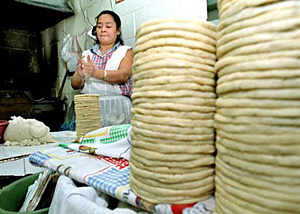 |
 |
 |
 Editorials | Opinions | October 2007 Editorials | Opinions | October 2007  
Mexico Food Crisis: Life, Death and Tortillas
 Esme Choonara - Socialist Worker Esme Choonara - Socialist Worker
go to original


| | The outpourings of anger over neoliberal policies date back to the rising in the province of Chiapas on 1 January 1994 – the day that Nafta came into force. The tortilla protests are just the latest expression of this anger. |
Rapid price rises in the cost of tortillas provoked angry demonstrations across Mexico earlier this year. Over 75,000 trade unionists, agricultural workers and others joined the biggest demonstration through Mexico City.

They called on the newly elected president, Felipe Calderon, to put a stop to the free market policies pushing up the price of corn (called maize in Britain) – the main ingredient in tortillas. Many workers also demanded wage rises to keep income above the rising price of food.

Millions of poor Mexicans rely on tortillas as their main source of nutrition. Many households spend up to a third of their income on corn flour to make tortillas. In the months leading up to the protests, the price of corn flour doubled in a month, provoking an outcry across Mexico.

One reason for the drastic rises was the diversion of much US corn into cultivation of grain for the manufacture of grain-based ethanol for fuel.

The other main reason is the neoliberal politics that have dominated Mexican government policy since the 1990s.

Tortilla prices have risen by over 700 percent since the institution of the North American Free Trade Agreement (Nafta) in 1994.

Before signing up to Nafta, the government regulated storing, importing and distributing grain through the National Company of Popular Subsistence. After Nafta, the grain industry was in effect privatised.

In 1998, president Ernesto Zedillo’s government handed much of the corn market over to private companies – in particular to the huge Maseca and Cargill groups.

The following year a corn-based subsidy program that fed 1.2 million poor families was axed.

Cargill is the second largest private company in the world and operates in 72 countries. It controls a huge proportion of the Mexican grain market, but also has a large stake in US grain exports. So if Mexican grain prices rise, Cargill benefits. If there is a crisis in Mexican grain and the market is flooded with US grain, again Cargill makes money.

Large grain processors can stockpile supplies and sell at inflated prices. For example, in 2006, Cargill bought 600,000 tonnes of white Mexican corn at 1,650 pesos per tonne and sold it six months later for 3,500 pesos per tonne.

Calderon doesn’t have solutions to the food crisis. Under pressure from the protests, he announced a price cap on tortillas.

The price cap was a “gentleman’s agreement” – in other words not binding – and was only signed by around 5,000 out of the 100,000 tortilla sellers in the county.

The price-cap doesn’t address the grip of corporate control over food production. In fact, it seems to have just opened up new markets for some companies.

Wal-Mart, already the largest retailer in Mexico, responded by selling tortillas at cheaper prices. This sparked concern that it would push small businesses out of the market and increase their own monopoly over food retail and production.

The outpourings of anger over neoliberal policies date back to the rising in the province of Chiapas on 1 January 1994 – the day that Nafta came into force. The tortilla protests are just the latest expression of this anger.

They show that as neoliberal policies push millions towards poverty and starvation it is workers and poor farmers who are key to fighting them. | 
 | |
 |



